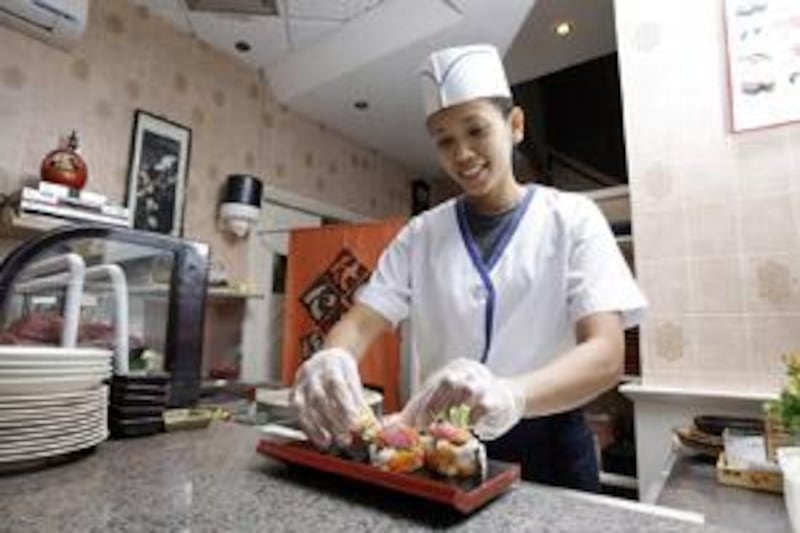It seems like hardly a week goes by without another grand opening of a contemporary Japanese restaurant. They've been springing up across Dubai with all the ubiquity of surgical face masks in Mexico City. In fact, the past nine months will probably go down in the UAE's gastronomic history as some kind of epidemic of modern, sophisticated and splashy Japanese fusion restaurants, the likes of which the Middle East had never witnessed before.
So many of these places have materialised recently that fears of a backlash may well be justified. Over the next 12 credit-crunched months, people may turn their backs on these ultra-trendy swank-pits and return to more traditional, friendly-neighbourhood Japanese restaurants like Bentoya Kitchen. So I decided to visit the long-established eatery off Sheikh Zayed Road to check out what could be the tundra-cool Japanese dining trend of tomorrow.
The first thing you notice about Bentoya Kitchen is the people. They're not here to flaunt their Giorgio Armani suits or Fendi handbags, that's for sure. And they haven't shown up to wear sunglasses indoors and pout moodily across the restaurant. These weirdos have actually come here to eat. As we walked through the door, people were merrily chomping on slices of sashimi or noisily slurping their way through bowls of nabeyaki udon soup. And not one of them was fiddling around with a BlackBerry. The outrage.
We were guided past the decidedly functional sushi bar to the upstairs dining area. Quite distinctly apart from the Japanese restaurants we've visited lately, there were no pulsing jellyfish in eerily glowing aquaria (Okku), no swooping abaca-panelled ceilings (Nobu) and thankfully no plastic pipes churning out dry ice (Kitsune). The room was simple, uncluttered and tidy, and would have been almost bare had it not been for the hanging cloth dividers separating each table. Quite obviously, I thought, if anything was going to stand out at Bentoya Kitchen it was going to be the food.
The tuna salad was as sumptuous as it was simple. It consisted of thickly cut pieces of raw fish, thinly sliced tomatoes and cucumber marinated in a citrus dressing. But the tuna (not the endangered bluefin variety) was extremely fresh, its flesh dense and packed with flavour. Then came the Dubai maki reverse, which crammed even more smooth tuna pieces alongside hunks of salmon and crisp cucumber in tightly packed, tobiko-dotted rolls drizzled in a spicy chilli mayonnaise. But the highlight of the starters was the unakyu maki reverse, which yielded tender, sticky and smoky morsels of marinated barbecued eel with yet more fresh slices of cucumber.
Then came an interesting twist. Bentoya Kitchen has long been patronised by Japanese expatriates because of its traditional take on Japanese food. There is no rock shrimp ceviche here. That's chiefly because rock shrimp ceviche is a contemporary Japanese fusion recipe drawing on Latin American influences, invented in the West by Nobu Matsuhisa. But I did find omu hayashi rice, a fusion dish with western origins made popular over the course of generations in Japan.
It consists of a fluffy omelette parcel of fried rice and chicken pieces slathered in a rich brown demi-glace sauce with shredded beef, onions and peas. It's a bit like the Japanese version of Hungarian goulash, but with an omelette thrown in for good measure. And it proves that the Japanese were experimenting with fusion cooking long before Nobu Matsuhisa learnt how to boil an egg. Omu hayashi rice has occupied a special place in Japanese food culture for long enough to stir cravings in expatriate Japanese people thousands of miles from home. Here they were, enjoying their yohshoku or western-style food, which is now part and parcel of the Japanese menu. And after practically wallowing in its comforting richness I could see why. The portion was huge, easily big enough for two, but it was accompanied by a bowl of tamago soup, which contained yet more thick omelette in a thin clear broth. And all for Dh55.
We finished with the most refreshing green tea I'd had in ages, and the most refreshing bill I'd seen in ages - a snip at just over Dh150 for two people. But I also felt invigorated by the unpretentious decor, the honest vibe, the sense of tradition and the simple yet devastatingly effective food. If this was what we can look forward to when the contemporary Japanese restaurant backlash begins, then I would raise a china teacup here and now to the future of Japan's culinary past.
Sheikh Zayed Road area, 04 343 0222. Average price for a meal for two: Dh100-150.






